Business Law Assignment: Incorporated vs. Unincorporated Businesses
VerifiedAdded on 2020/10/22
|16
|5762
|142
Report
AI Summary
This business law assignment provides a comprehensive overview of the UK legal system and its impact on businesses. It begins with an analysis of parliamentary sovereignty and explores the various sources of law, including statutes, common law, and equity law. The report then examines the role of the government in the law-making process, detailing the stages of bill passage and the application of statutory and common laws in justice courts. Furthermore, it investigates the impact of employment and contract laws on businesses, differentiating between legislation, regulations, and standards. The assignment also delves into the nature and formation of different business types, contrasting incorporated and unincorporated businesses and analyzing the advantages and disadvantages of partnerships and companies. Finally, it includes case studies to illustrate legal concepts and concludes with recommendations for resolving business disputes based on UK law.

Business Law
Paraphrase This Document
Need a fresh take? Get an instant paraphrase of this document with our AI Paraphraser
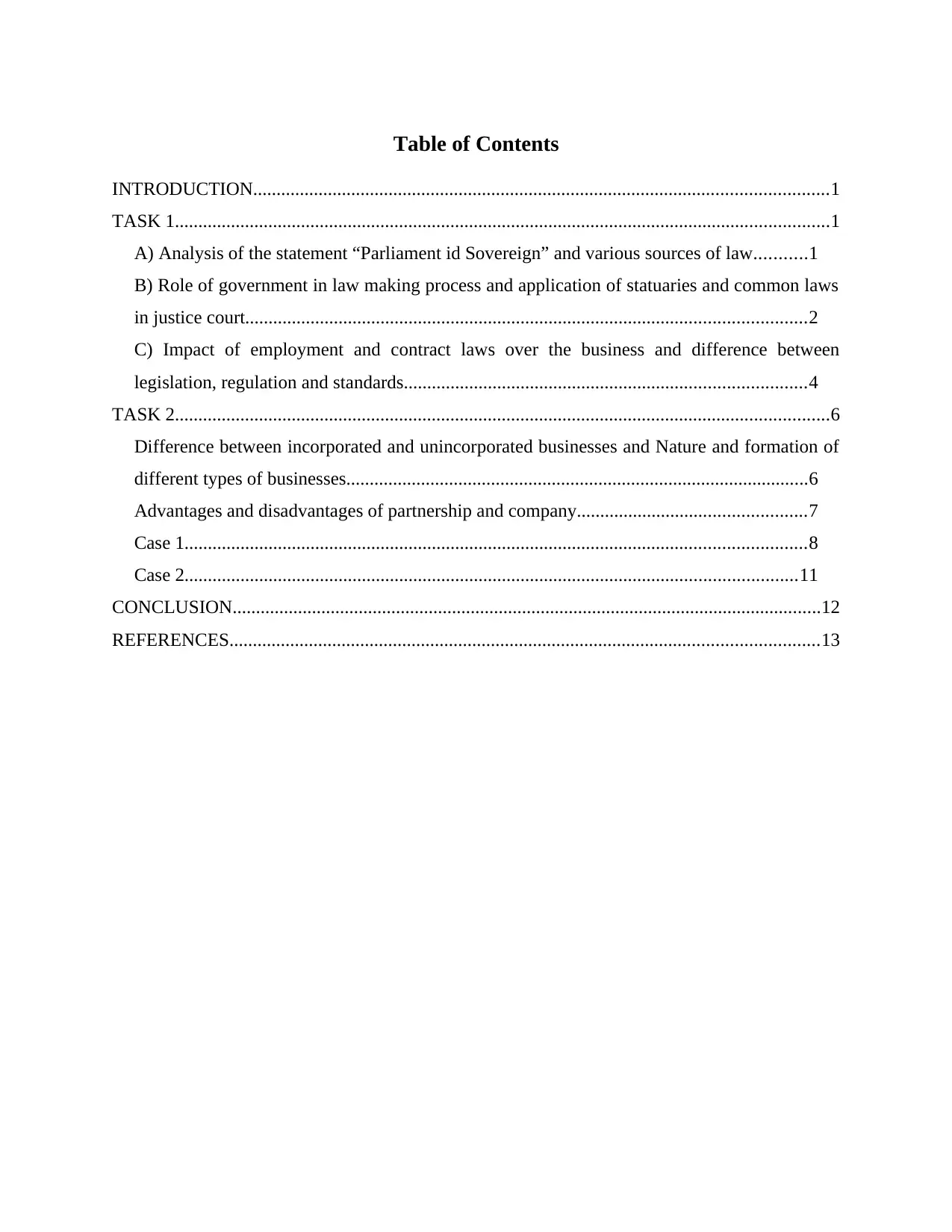
Table of Contents
INTRODUCTION...........................................................................................................................1
TASK 1............................................................................................................................................1
A) Analysis of the statement “Parliament id Sovereign” and various sources of law...........1
B) Role of government in law making process and application of statuaries and common laws
in justice court........................................................................................................................2
C) Impact of employment and contract laws over the business and difference between
legislation, regulation and standards......................................................................................4
TASK 2............................................................................................................................................6
Difference between incorporated and unincorporated businesses and Nature and formation of
different types of businesses...................................................................................................6
Advantages and disadvantages of partnership and company.................................................7
Case 1.....................................................................................................................................8
Case 2...................................................................................................................................11
CONCLUSION..............................................................................................................................12
REFERENCES..............................................................................................................................13
INTRODUCTION...........................................................................................................................1
TASK 1............................................................................................................................................1
A) Analysis of the statement “Parliament id Sovereign” and various sources of law...........1
B) Role of government in law making process and application of statuaries and common laws
in justice court........................................................................................................................2
C) Impact of employment and contract laws over the business and difference between
legislation, regulation and standards......................................................................................4
TASK 2............................................................................................................................................6
Difference between incorporated and unincorporated businesses and Nature and formation of
different types of businesses...................................................................................................6
Advantages and disadvantages of partnership and company.................................................7
Case 1.....................................................................................................................................8
Case 2...................................................................................................................................11
CONCLUSION..............................................................................................................................12
REFERENCES..............................................................................................................................13
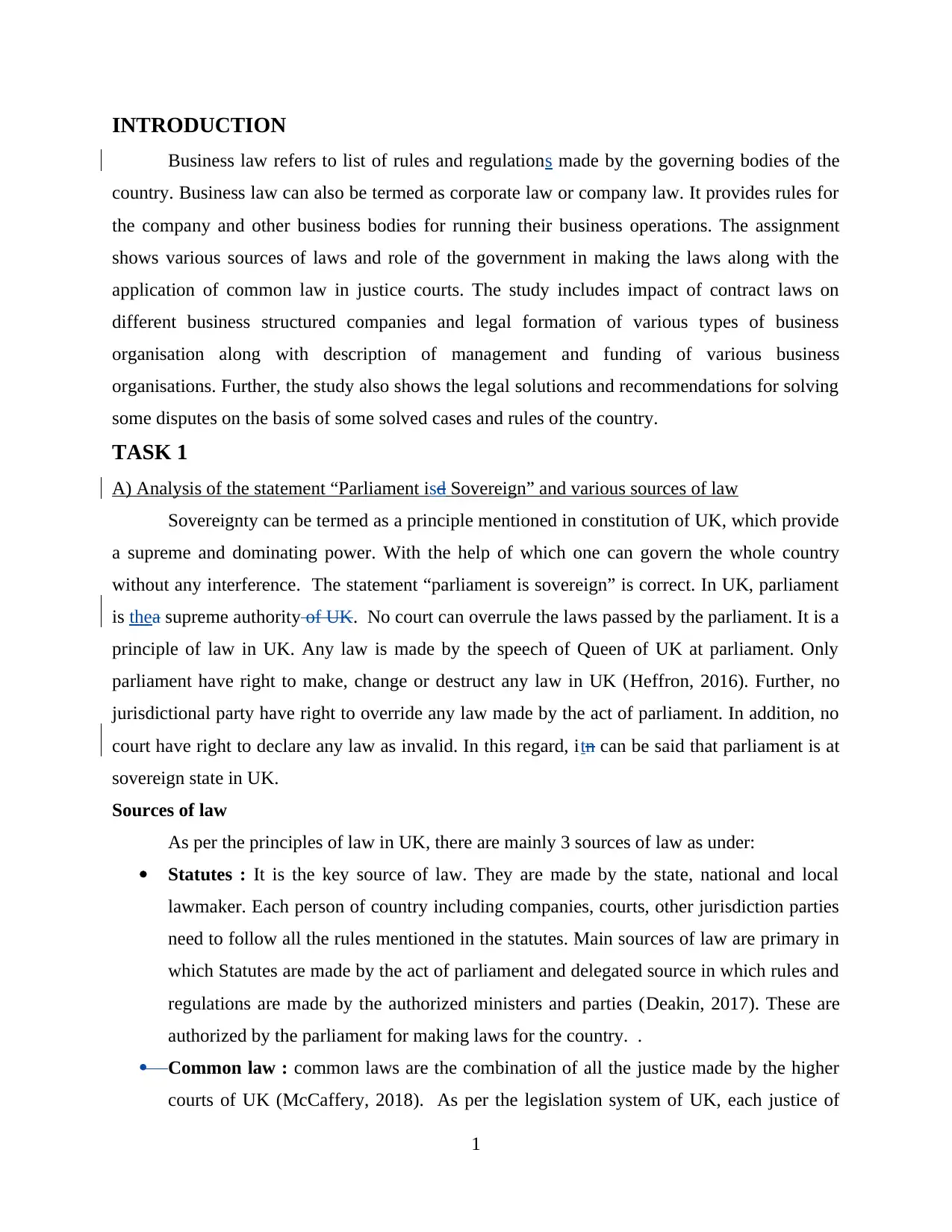
INTRODUCTION
Business law refers to list of rules and regulations made by the governing bodies of the
country. Business law can also be termed as corporate law or company law. It provides rules for
the company and other business bodies for running their business operations. The assignment
shows various sources of laws and role of the government in making the laws along with the
application of common law in justice courts. The study includes impact of contract laws on
different business structured companies and legal formation of various types of business
organisation along with description of management and funding of various business
organisations. Further, the study also shows the legal solutions and recommendations for solving
some disputes on the basis of some solved cases and rules of the country.
TASK 1
A) Analysis of the statement “Parliament isd Sovereign” and various sources of law
Sovereignty can be termed as a principle mentioned in constitution of UK, which provide
a supreme and dominating power. With the help of which one can govern the whole country
without any interference. The statement “parliament is sovereign” is correct. In UK, parliament
is thea supreme authority of UK. No court can overrule the laws passed by the parliament. It is a
principle of law in UK. Any law is made by the speech of Queen of UK at parliament. Only
parliament have right to make, change or destruct any law in UK (Heffron, 2016). Further, no
jurisdictional party have right to override any law made by the act of parliament. In addition, no
court have right to declare any law as invalid. In this regard, itn can be said that parliament is at
sovereign state in UK.
Sources of law
As per the principles of law in UK, there are mainly 3 sources of law as under:
Statutes : It is the key source of law. They are made by the state, national and local
lawmaker. Each person of country including companies, courts, other jurisdiction parties
need to follow all the rules mentioned in the statutes. Main sources of law are primary in
which Statutes are made by the act of parliament and delegated source in which rules and
regulations are made by the authorized ministers and parties (Deakin, 2017). These are
authorized by the parliament for making laws for the country. .
Common law : common laws are the combination of all the justice made by the higher
courts of UK (McCaffery, 2018). As per the legislation system of UK, each justice of
1
Business law refers to list of rules and regulations made by the governing bodies of the
country. Business law can also be termed as corporate law or company law. It provides rules for
the company and other business bodies for running their business operations. The assignment
shows various sources of laws and role of the government in making the laws along with the
application of common law in justice courts. The study includes impact of contract laws on
different business structured companies and legal formation of various types of business
organisation along with description of management and funding of various business
organisations. Further, the study also shows the legal solutions and recommendations for solving
some disputes on the basis of some solved cases and rules of the country.
TASK 1
A) Analysis of the statement “Parliament isd Sovereign” and various sources of law
Sovereignty can be termed as a principle mentioned in constitution of UK, which provide
a supreme and dominating power. With the help of which one can govern the whole country
without any interference. The statement “parliament is sovereign” is correct. In UK, parliament
is thea supreme authority of UK. No court can overrule the laws passed by the parliament. It is a
principle of law in UK. Any law is made by the speech of Queen of UK at parliament. Only
parliament have right to make, change or destruct any law in UK (Heffron, 2016). Further, no
jurisdictional party have right to override any law made by the act of parliament. In addition, no
court have right to declare any law as invalid. In this regard, itn can be said that parliament is at
sovereign state in UK.
Sources of law
As per the principles of law in UK, there are mainly 3 sources of law as under:
Statutes : It is the key source of law. They are made by the state, national and local
lawmaker. Each person of country including companies, courts, other jurisdiction parties
need to follow all the rules mentioned in the statutes. Main sources of law are primary in
which Statutes are made by the act of parliament and delegated source in which rules and
regulations are made by the authorized ministers and parties (Deakin, 2017). These are
authorized by the parliament for making laws for the country. .
Common law : common laws are the combination of all the justice made by the higher
courts of UK (McCaffery, 2018). As per the legislation system of UK, each justice of
1
⊘ This is a preview!⊘
Do you want full access?
Subscribe today to unlock all pages.

Trusted by 1+ million students worldwide
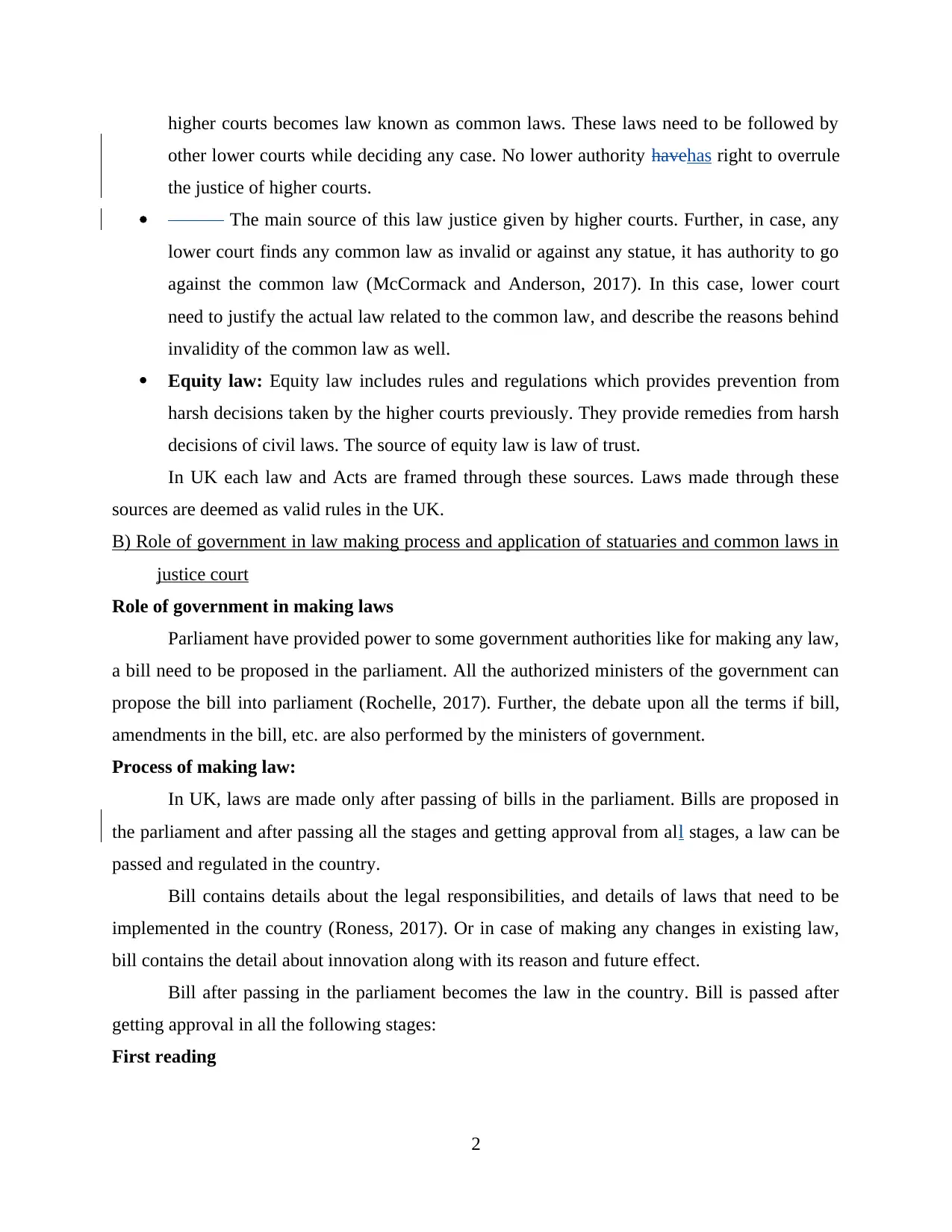
higher courts becomes law known as common laws. These laws need to be followed by
other lower courts while deciding any case. No lower authority havehas right to overrule
the justice of higher courts.
The main source of this law justice given by higher courts. Further, in case, any
lower court finds any common law as invalid or against any statue, it has authority to go
against the common law (McCormack and Anderson, 2017). In this case, lower court
need to justify the actual law related to the common law, and describe the reasons behind
invalidity of the common law as well.
Equity law: Equity law includes rules and regulations which provides prevention from
harsh decisions taken by the higher courts previously. They provide remedies from harsh
decisions of civil laws. The source of equity law is law of trust.
In UK each law and Acts are framed through these sources. Laws made through these
sources are deemed as valid rules in the UK.
B) Role of government in law making process and application of statuaries and common laws in
justice court
Role of government in making laws
Parliament have provided power to some government authorities like for making any law,
a bill need to be proposed in the parliament. All the authorized ministers of the government can
propose the bill into parliament (Rochelle, 2017). Further, the debate upon all the terms if bill,
amendments in the bill, etc. are also performed by the ministers of government.
Process of making law:
In UK, laws are made only after passing of bills in the parliament. Bills are proposed in
the parliament and after passing all the stages and getting approval from all stages, a law can be
passed and regulated in the country.
Bill contains details about the legal responsibilities, and details of laws that need to be
implemented in the country (Roness, 2017). Or in case of making any changes in existing law,
bill contains the detail about innovation along with its reason and future effect.
Bill after passing in the parliament becomes the law in the country. Bill is passed after
getting approval in all the following stages:
First reading
2
other lower courts while deciding any case. No lower authority havehas right to overrule
the justice of higher courts.
The main source of this law justice given by higher courts. Further, in case, any
lower court finds any common law as invalid or against any statue, it has authority to go
against the common law (McCormack and Anderson, 2017). In this case, lower court
need to justify the actual law related to the common law, and describe the reasons behind
invalidity of the common law as well.
Equity law: Equity law includes rules and regulations which provides prevention from
harsh decisions taken by the higher courts previously. They provide remedies from harsh
decisions of civil laws. The source of equity law is law of trust.
In UK each law and Acts are framed through these sources. Laws made through these
sources are deemed as valid rules in the UK.
B) Role of government in law making process and application of statuaries and common laws in
justice court
Role of government in making laws
Parliament have provided power to some government authorities like for making any law,
a bill need to be proposed in the parliament. All the authorized ministers of the government can
propose the bill into parliament (Rochelle, 2017). Further, the debate upon all the terms if bill,
amendments in the bill, etc. are also performed by the ministers of government.
Process of making law:
In UK, laws are made only after passing of bills in the parliament. Bills are proposed in
the parliament and after passing all the stages and getting approval from all stages, a law can be
passed and regulated in the country.
Bill contains details about the legal responsibilities, and details of laws that need to be
implemented in the country (Roness, 2017). Or in case of making any changes in existing law,
bill contains the detail about innovation along with its reason and future effect.
Bill after passing in the parliament becomes the law in the country. Bill is passed after
getting approval in all the following stages:
First reading
2
Paraphrase This Document
Need a fresh take? Get an instant paraphrase of this document with our AI Paraphraser
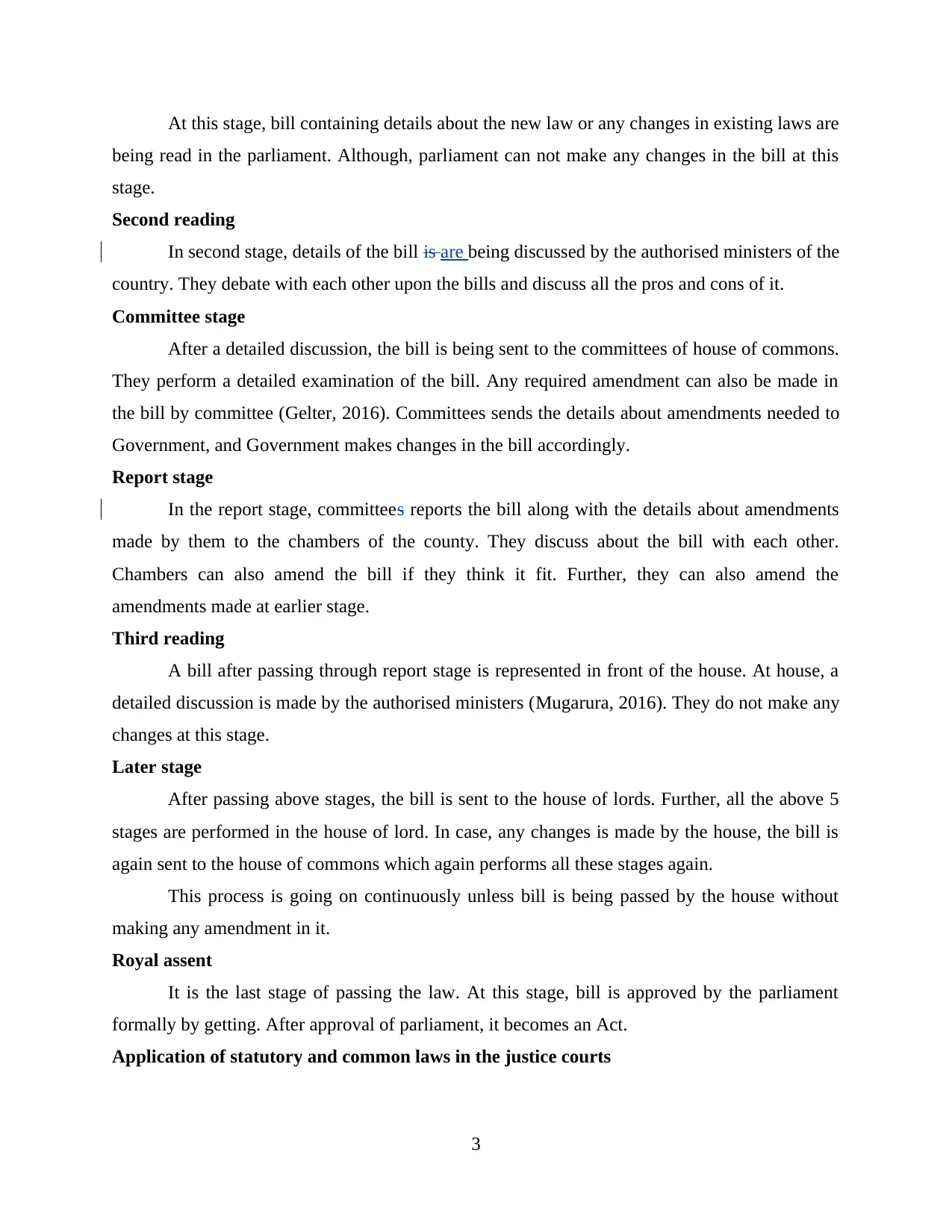
At this stage, bill containing details about the new law or any changes in existing laws are
being read in the parliament. Although, parliament can not make any changes in the bill at this
stage.
Second reading
In second stage, details of the bill is are being discussed by the authorised ministers of the
country. They debate with each other upon the bills and discuss all the pros and cons of it.
Committee stage
After a detailed discussion, the bill is being sent to the committees of house of commons.
They perform a detailed examination of the bill. Any required amendment can also be made in
the bill by committee (Gelter, 2016). Committees sends the details about amendments needed to
Government, and Government makes changes in the bill accordingly.
Report stage
In the report stage, committees reports the bill along with the details about amendments
made by them to the chambers of the county. They discuss about the bill with each other.
Chambers can also amend the bill if they think it fit. Further, they can also amend the
amendments made at earlier stage.
Third reading
A bill after passing through report stage is represented in front of the house. At house, a
detailed discussion is made by the authorised ministers (Mugarura, 2016). They do not make any
changes at this stage.
Later stage
After passing above stages, the bill is sent to the house of lords. Further, all the above 5
stages are performed in the house of lord. In case, any changes is made by the house, the bill is
again sent to the house of commons which again performs all these stages again.
This process is going on continuously unless bill is being passed by the house without
making any amendment in it.
Royal assent
It is the last stage of passing the law. At this stage, bill is approved by the parliament
formally by getting. After approval of parliament, it becomes an Act.
Application of statutory and common laws in the justice courts
3
being read in the parliament. Although, parliament can not make any changes in the bill at this
stage.
Second reading
In second stage, details of the bill is are being discussed by the authorised ministers of the
country. They debate with each other upon the bills and discuss all the pros and cons of it.
Committee stage
After a detailed discussion, the bill is being sent to the committees of house of commons.
They perform a detailed examination of the bill. Any required amendment can also be made in
the bill by committee (Gelter, 2016). Committees sends the details about amendments needed to
Government, and Government makes changes in the bill accordingly.
Report stage
In the report stage, committees reports the bill along with the details about amendments
made by them to the chambers of the county. They discuss about the bill with each other.
Chambers can also amend the bill if they think it fit. Further, they can also amend the
amendments made at earlier stage.
Third reading
A bill after passing through report stage is represented in front of the house. At house, a
detailed discussion is made by the authorised ministers (Mugarura, 2016). They do not make any
changes at this stage.
Later stage
After passing above stages, the bill is sent to the house of lords. Further, all the above 5
stages are performed in the house of lord. In case, any changes is made by the house, the bill is
again sent to the house of commons which again performs all these stages again.
This process is going on continuously unless bill is being passed by the house without
making any amendment in it.
Royal assent
It is the last stage of passing the law. At this stage, bill is approved by the parliament
formally by getting. After approval of parliament, it becomes an Act.
Application of statutory and common laws in the justice courts
3
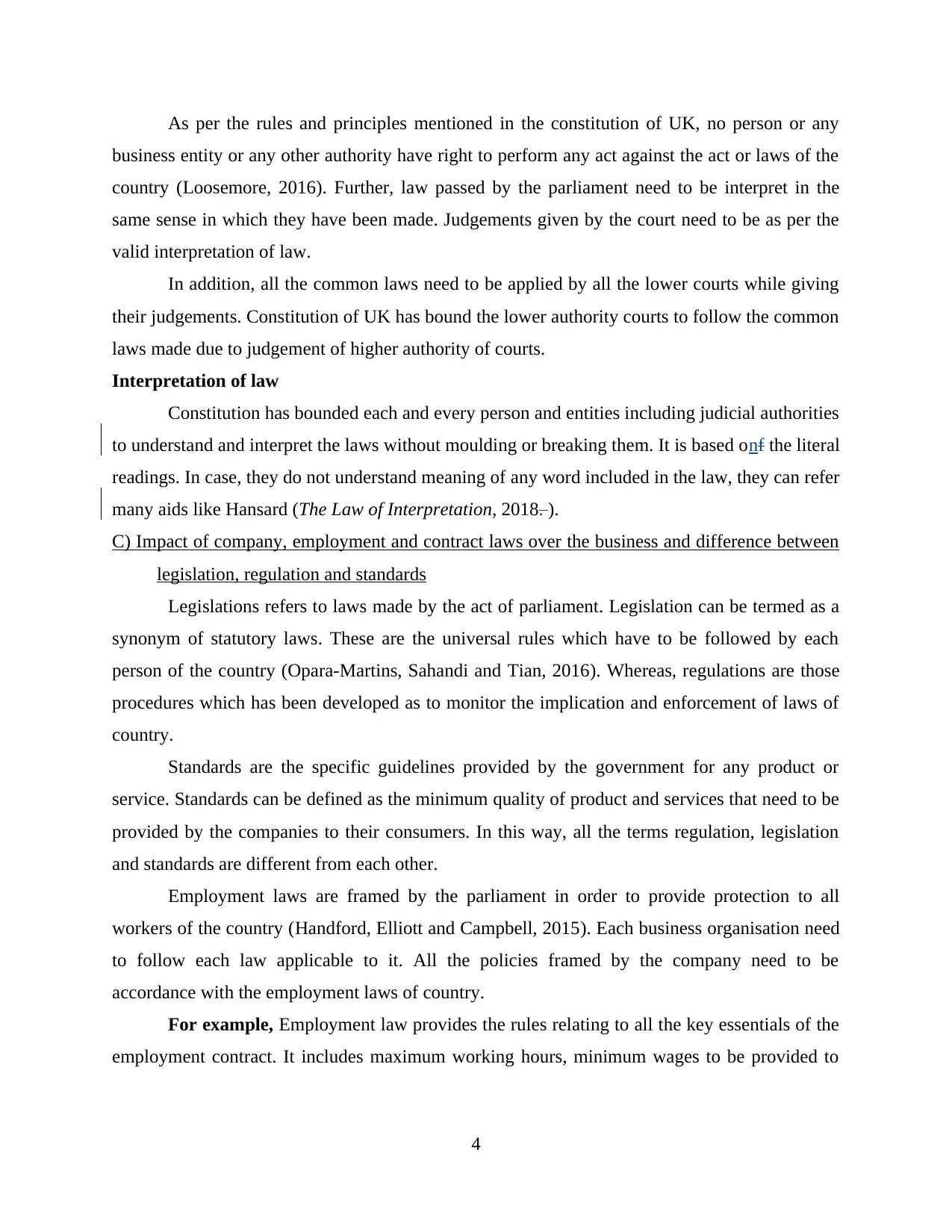
As per the rules and principles mentioned in the constitution of UK, no person or any
business entity or any other authority have right to perform any act against the act or laws of the
country (Loosemore, 2016). Further, law passed by the parliament need to be interpret in the
same sense in which they have been made. Judgements given by the court need to be as per the
valid interpretation of law.
In addition, all the common laws need to be applied by all the lower courts while giving
their judgements. Constitution of UK has bound the lower authority courts to follow the common
laws made due to judgement of higher authority of courts.
Interpretation of law
Constitution has bounded each and every person and entities including judicial authorities
to understand and interpret the laws without moulding or breaking them. It is based onf the literal
readings. In case, they do not understand meaning of any word included in the law, they can refer
many aids like Hansard (The Law of Interpretation, 2018. ).
C) Impact of company, employment and contract laws over the business and difference between
legislation, regulation and standards
Legislations refers to laws made by the act of parliament. Legislation can be termed as a
synonym of statutory laws. These are the universal rules which have to be followed by each
person of the country (Opara-Martins, Sahandi and Tian, 2016). Whereas, regulations are those
procedures which has been developed as to monitor the implication and enforcement of laws of
country.
Standards are the specific guidelines provided by the government for any product or
service. Standards can be defined as the minimum quality of product and services that need to be
provided by the companies to their consumers. In this way, all the terms regulation, legislation
and standards are different from each other.
Employment laws are framed by the parliament in order to provide protection to all
workers of the country (Handford, Elliott and Campbell, 2015). Each business organisation need
to follow each law applicable to it. All the policies framed by the company need to be
accordance with the employment laws of country.
For example, Employment law provides the rules relating to all the key essentials of the
employment contract. It includes maximum working hours, minimum wages to be provided to
4
business entity or any other authority have right to perform any act against the act or laws of the
country (Loosemore, 2016). Further, law passed by the parliament need to be interpret in the
same sense in which they have been made. Judgements given by the court need to be as per the
valid interpretation of law.
In addition, all the common laws need to be applied by all the lower courts while giving
their judgements. Constitution of UK has bound the lower authority courts to follow the common
laws made due to judgement of higher authority of courts.
Interpretation of law
Constitution has bounded each and every person and entities including judicial authorities
to understand and interpret the laws without moulding or breaking them. It is based onf the literal
readings. In case, they do not understand meaning of any word included in the law, they can refer
many aids like Hansard (The Law of Interpretation, 2018. ).
C) Impact of company, employment and contract laws over the business and difference between
legislation, regulation and standards
Legislations refers to laws made by the act of parliament. Legislation can be termed as a
synonym of statutory laws. These are the universal rules which have to be followed by each
person of the country (Opara-Martins, Sahandi and Tian, 2016). Whereas, regulations are those
procedures which has been developed as to monitor the implication and enforcement of laws of
country.
Standards are the specific guidelines provided by the government for any product or
service. Standards can be defined as the minimum quality of product and services that need to be
provided by the companies to their consumers. In this way, all the terms regulation, legislation
and standards are different from each other.
Employment laws are framed by the parliament in order to provide protection to all
workers of the country (Handford, Elliott and Campbell, 2015). Each business organisation need
to follow each law applicable to it. All the policies framed by the company need to be
accordance with the employment laws of country.
For example, Employment law provides the rules relating to all the key essentials of the
employment contract. It includes maximum working hours, minimum wages to be provided to
4
⊘ This is a preview!⊘
Do you want full access?
Subscribe today to unlock all pages.

Trusted by 1+ million students worldwide
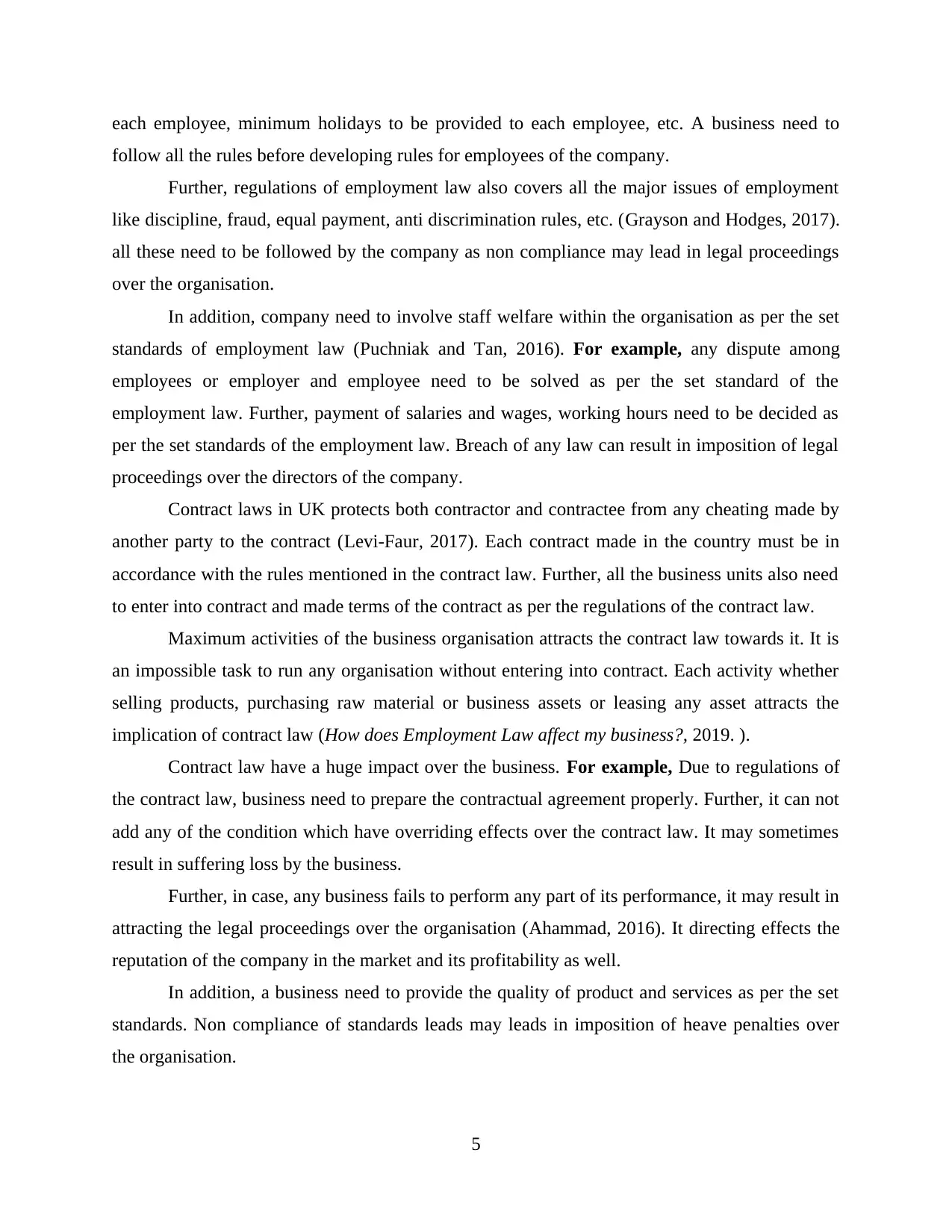
each employee, minimum holidays to be provided to each employee, etc. A business need to
follow all the rules before developing rules for employees of the company.
Further, regulations of employment law also covers all the major issues of employment
like discipline, fraud, equal payment, anti discrimination rules, etc. (Grayson and Hodges, 2017).
all these need to be followed by the company as non compliance may lead in legal proceedings
over the organisation.
In addition, company need to involve staff welfare within the organisation as per the set
standards of employment law (Puchniak and Tan, 2016). For example, any dispute among
employees or employer and employee need to be solved as per the set standard of the
employment law. Further, payment of salaries and wages, working hours need to be decided as
per the set standards of the employment law. Breach of any law can result in imposition of legal
proceedings over the directors of the company.
Contract laws in UK protects both contractor and contractee from any cheating made by
another party to the contract (Levi-Faur, 2017). Each contract made in the country must be in
accordance with the rules mentioned in the contract law. Further, all the business units also need
to enter into contract and made terms of the contract as per the regulations of the contract law.
Maximum activities of the business organisation attracts the contract law towards it. It is
an impossible task to run any organisation without entering into contract. Each activity whether
selling products, purchasing raw material or business assets or leasing any asset attracts the
implication of contract law (How does Employment Law affect my business?, 2019. ).
Contract law have a huge impact over the business. For example, Due to regulations of
the contract law, business need to prepare the contractual agreement properly. Further, it can not
add any of the condition which have overriding effects over the contract law. It may sometimes
result in suffering loss by the business.
Further, in case, any business fails to perform any part of its performance, it may result in
attracting the legal proceedings over the organisation (Ahammad, 2016). It directing effects the
reputation of the company in the market and its profitability as well.
In addition, a business need to provide the quality of product and services as per the set
standards. Non compliance of standards leads may leads in imposition of heave penalties over
the organisation.
5
follow all the rules before developing rules for employees of the company.
Further, regulations of employment law also covers all the major issues of employment
like discipline, fraud, equal payment, anti discrimination rules, etc. (Grayson and Hodges, 2017).
all these need to be followed by the company as non compliance may lead in legal proceedings
over the organisation.
In addition, company need to involve staff welfare within the organisation as per the set
standards of employment law (Puchniak and Tan, 2016). For example, any dispute among
employees or employer and employee need to be solved as per the set standard of the
employment law. Further, payment of salaries and wages, working hours need to be decided as
per the set standards of the employment law. Breach of any law can result in imposition of legal
proceedings over the directors of the company.
Contract laws in UK protects both contractor and contractee from any cheating made by
another party to the contract (Levi-Faur, 2017). Each contract made in the country must be in
accordance with the rules mentioned in the contract law. Further, all the business units also need
to enter into contract and made terms of the contract as per the regulations of the contract law.
Maximum activities of the business organisation attracts the contract law towards it. It is
an impossible task to run any organisation without entering into contract. Each activity whether
selling products, purchasing raw material or business assets or leasing any asset attracts the
implication of contract law (How does Employment Law affect my business?, 2019. ).
Contract law have a huge impact over the business. For example, Due to regulations of
the contract law, business need to prepare the contractual agreement properly. Further, it can not
add any of the condition which have overriding effects over the contract law. It may sometimes
result in suffering loss by the business.
Further, in case, any business fails to perform any part of its performance, it may result in
attracting the legal proceedings over the organisation (Ahammad, 2016). It directing effects the
reputation of the company in the market and its profitability as well.
In addition, a business need to provide the quality of product and services as per the set
standards. Non compliance of standards leads may leads in imposition of heave penalties over
the organisation.
5
Paraphrase This Document
Need a fresh take? Get an instant paraphrase of this document with our AI Paraphraser
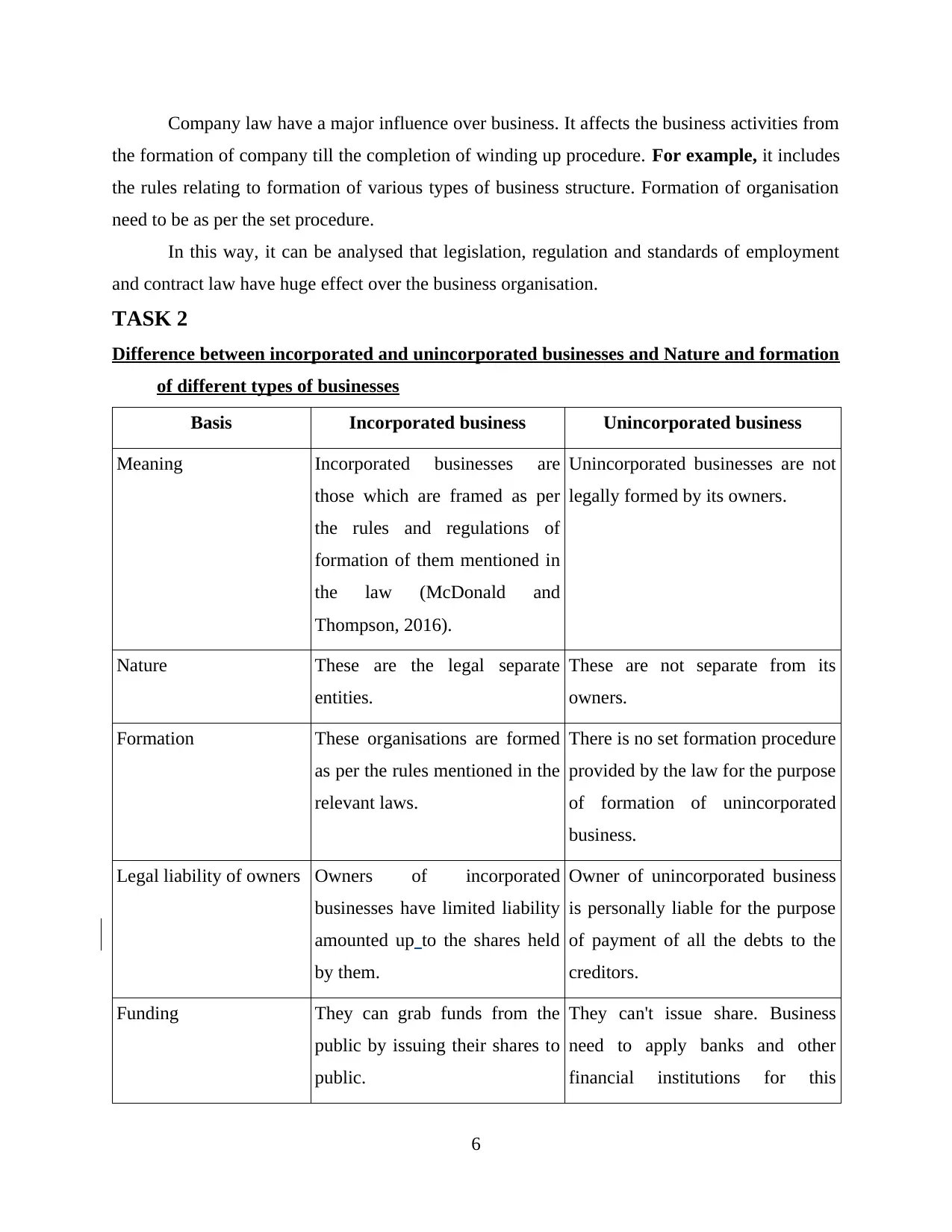
Company law have a major influence over business. It affects the business activities from
the formation of company till the completion of winding up procedure. For example, it includes
the rules relating to formation of various types of business structure. Formation of organisation
need to be as per the set procedure.
In this way, it can be analysed that legislation, regulation and standards of employment
and contract law have huge effect over the business organisation.
TASK 2
Difference between incorporated and unincorporated businesses and Nature and formation
of different types of businesses
Basis Incorporated business Unincorporated business
Meaning Incorporated businesses are
those which are framed as per
the rules and regulations of
formation of them mentioned in
the law (McDonald and
Thompson, 2016).
Unincorporated businesses are not
legally formed by its owners.
Nature These are the legal separate
entities.
These are not separate from its
owners.
Formation These organisations are formed
as per the rules mentioned in the
relevant laws.
There is no set formation procedure
provided by the law for the purpose
of formation of unincorporated
business.
Legal liability of owners Owners of incorporated
businesses have limited liability
amounted up to the shares held
by them.
Owner of unincorporated business
is personally liable for the purpose
of payment of all the debts to the
creditors.
Funding They can grab funds from the
public by issuing their shares to
public.
They can't issue share. Business
need to apply banks and other
financial institutions for this
6
the formation of company till the completion of winding up procedure. For example, it includes
the rules relating to formation of various types of business structure. Formation of organisation
need to be as per the set procedure.
In this way, it can be analysed that legislation, regulation and standards of employment
and contract law have huge effect over the business organisation.
TASK 2
Difference between incorporated and unincorporated businesses and Nature and formation
of different types of businesses
Basis Incorporated business Unincorporated business
Meaning Incorporated businesses are
those which are framed as per
the rules and regulations of
formation of them mentioned in
the law (McDonald and
Thompson, 2016).
Unincorporated businesses are not
legally formed by its owners.
Nature These are the legal separate
entities.
These are not separate from its
owners.
Formation These organisations are formed
as per the rules mentioned in the
relevant laws.
There is no set formation procedure
provided by the law for the purpose
of formation of unincorporated
business.
Legal liability of owners Owners of incorporated
businesses have limited liability
amounted up to the shares held
by them.
Owner of unincorporated business
is personally liable for the purpose
of payment of all the debts to the
creditors.
Funding They can grab funds from the
public by issuing their shares to
public.
They can't issue share. Business
need to apply banks and other
financial institutions for this
6
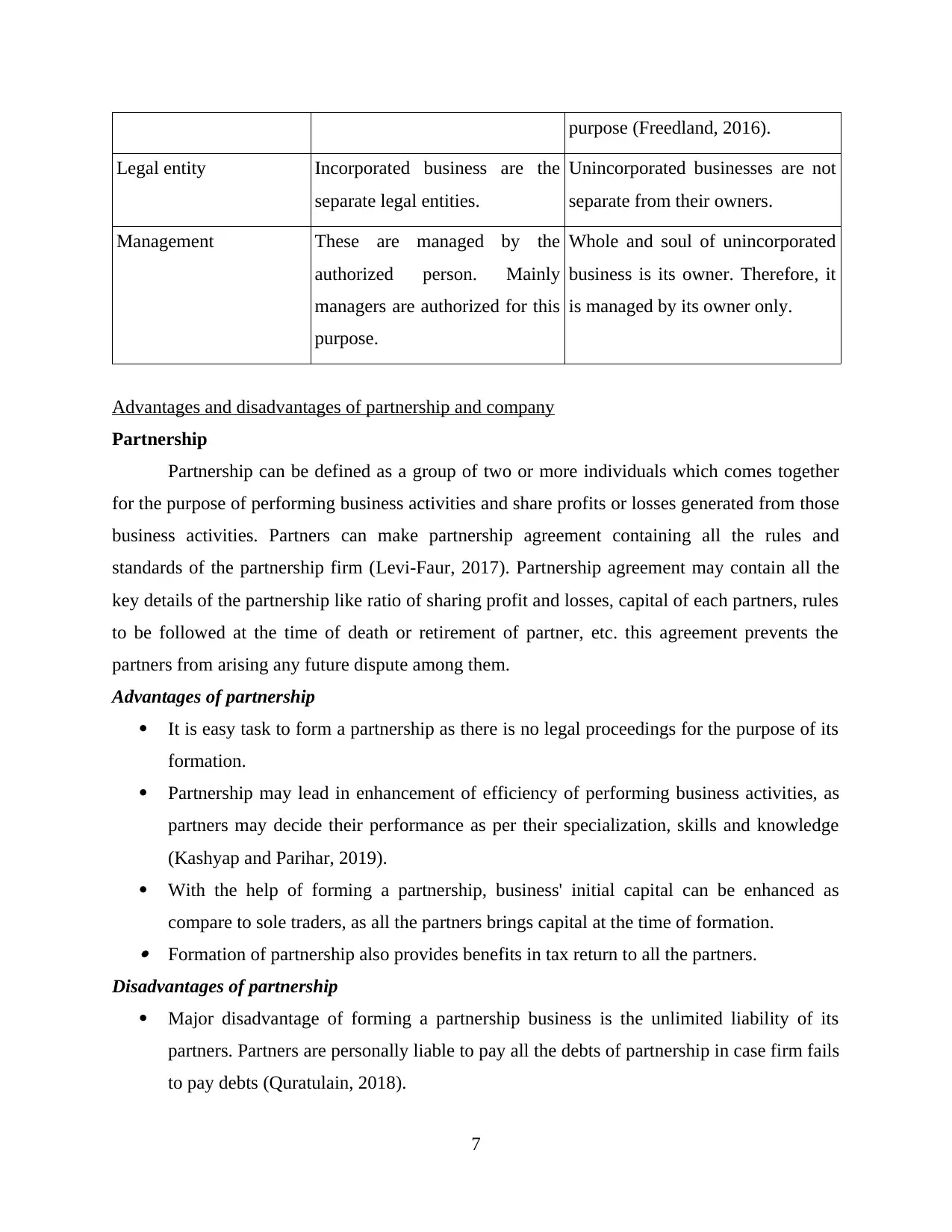
purpose (Freedland, 2016).
Legal entity Incorporated business are the
separate legal entities.
Unincorporated businesses are not
separate from their owners.
Management These are managed by the
authorized person. Mainly
managers are authorized for this
purpose.
Whole and soul of unincorporated
business is its owner. Therefore, it
is managed by its owner only.
Advantages and disadvantages of partnership and company
Partnership
Partnership can be defined as a group of two or more individuals which comes together
for the purpose of performing business activities and share profits or losses generated from those
business activities. Partners can make partnership agreement containing all the rules and
standards of the partnership firm (Levi-Faur, 2017). Partnership agreement may contain all the
key details of the partnership like ratio of sharing profit and losses, capital of each partners, rules
to be followed at the time of death or retirement of partner, etc. this agreement prevents the
partners from arising any future dispute among them.
Advantages of partnership
It is easy task to form a partnership as there is no legal proceedings for the purpose of its
formation.
Partnership may lead in enhancement of efficiency of performing business activities, as
partners may decide their performance as per their specialization, skills and knowledge
(Kashyap and Parihar, 2019).
With the help of forming a partnership, business' initial capital can be enhanced as
compare to sole traders, as all the partners brings capital at the time of formation. Formation of partnership also provides benefits in tax return to all the partners.
Disadvantages of partnership
Major disadvantage of forming a partnership business is the unlimited liability of its
partners. Partners are personally liable to pay all the debts of partnership in case firm fails
to pay debts (Quratulain, 2018).
7
Legal entity Incorporated business are the
separate legal entities.
Unincorporated businesses are not
separate from their owners.
Management These are managed by the
authorized person. Mainly
managers are authorized for this
purpose.
Whole and soul of unincorporated
business is its owner. Therefore, it
is managed by its owner only.
Advantages and disadvantages of partnership and company
Partnership
Partnership can be defined as a group of two or more individuals which comes together
for the purpose of performing business activities and share profits or losses generated from those
business activities. Partners can make partnership agreement containing all the rules and
standards of the partnership firm (Levi-Faur, 2017). Partnership agreement may contain all the
key details of the partnership like ratio of sharing profit and losses, capital of each partners, rules
to be followed at the time of death or retirement of partner, etc. this agreement prevents the
partners from arising any future dispute among them.
Advantages of partnership
It is easy task to form a partnership as there is no legal proceedings for the purpose of its
formation.
Partnership may lead in enhancement of efficiency of performing business activities, as
partners may decide their performance as per their specialization, skills and knowledge
(Kashyap and Parihar, 2019).
With the help of forming a partnership, business' initial capital can be enhanced as
compare to sole traders, as all the partners brings capital at the time of formation. Formation of partnership also provides benefits in tax return to all the partners.
Disadvantages of partnership
Major disadvantage of forming a partnership business is the unlimited liability of its
partners. Partners are personally liable to pay all the debts of partnership in case firm fails
to pay debts (Quratulain, 2018).
7
⊘ This is a preview!⊘
Do you want full access?
Subscribe today to unlock all pages.

Trusted by 1+ million students worldwide
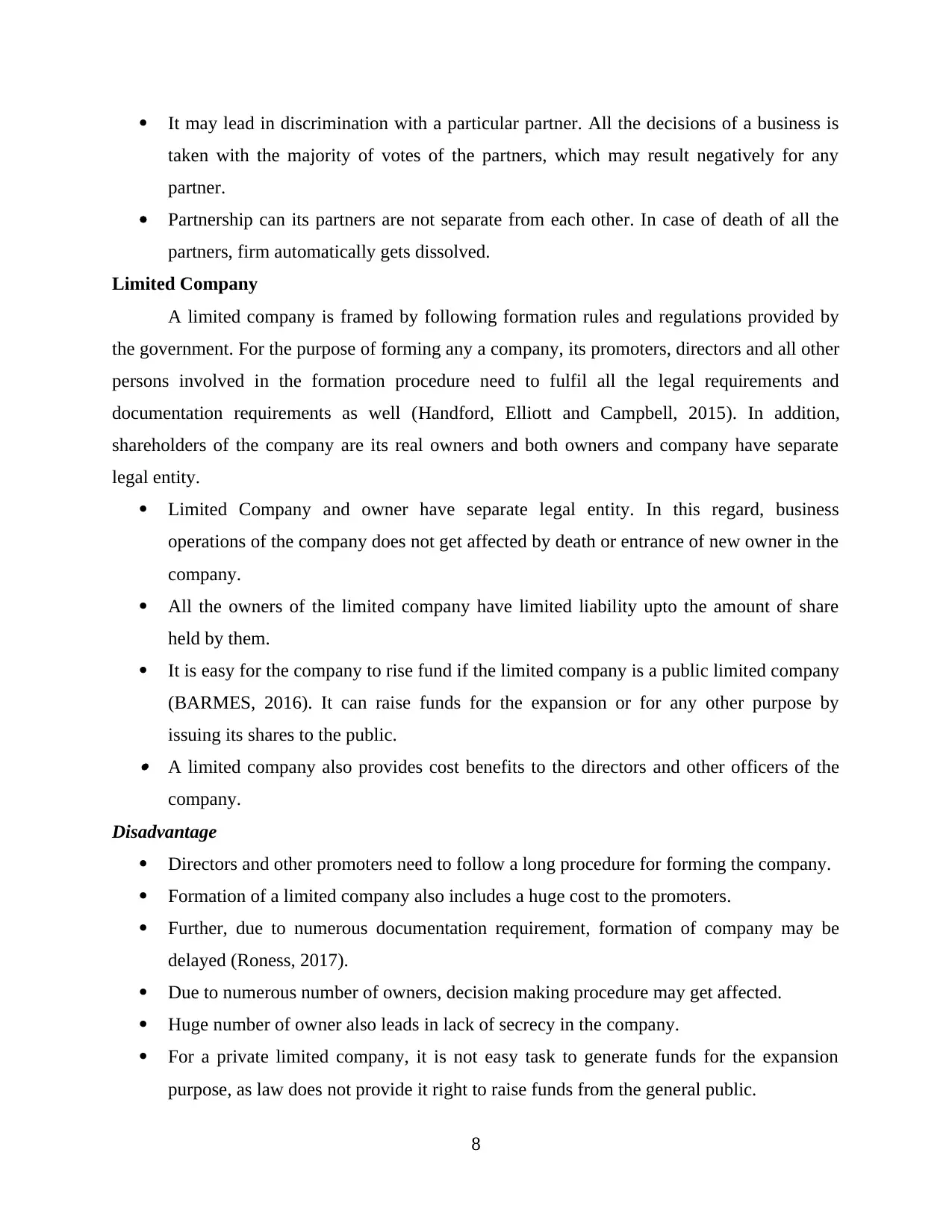
It may lead in discrimination with a particular partner. All the decisions of a business is
taken with the majority of votes of the partners, which may result negatively for any
partner.
Partnership can its partners are not separate from each other. In case of death of all the
partners, firm automatically gets dissolved.
Limited Company
A limited company is framed by following formation rules and regulations provided by
the government. For the purpose of forming any a company, its promoters, directors and all other
persons involved in the formation procedure need to fulfil all the legal requirements and
documentation requirements as well (Handford, Elliott and Campbell, 2015). In addition,
shareholders of the company are its real owners and both owners and company have separate
legal entity.
Limited Company and owner have separate legal entity. In this regard, business
operations of the company does not get affected by death or entrance of new owner in the
company.
All the owners of the limited company have limited liability upto the amount of share
held by them.
It is easy for the company to rise fund if the limited company is a public limited company
(BARMES, 2016). It can raise funds for the expansion or for any other purpose by
issuing its shares to the public. A limited company also provides cost benefits to the directors and other officers of the
company.
Disadvantage
Directors and other promoters need to follow a long procedure for forming the company.
Formation of a limited company also includes a huge cost to the promoters.
Further, due to numerous documentation requirement, formation of company may be
delayed (Roness, 2017).
Due to numerous number of owners, decision making procedure may get affected.
Huge number of owner also leads in lack of secrecy in the company.
For a private limited company, it is not easy task to generate funds for the expansion
purpose, as law does not provide it right to raise funds from the general public.
8
taken with the majority of votes of the partners, which may result negatively for any
partner.
Partnership can its partners are not separate from each other. In case of death of all the
partners, firm automatically gets dissolved.
Limited Company
A limited company is framed by following formation rules and regulations provided by
the government. For the purpose of forming any a company, its promoters, directors and all other
persons involved in the formation procedure need to fulfil all the legal requirements and
documentation requirements as well (Handford, Elliott and Campbell, 2015). In addition,
shareholders of the company are its real owners and both owners and company have separate
legal entity.
Limited Company and owner have separate legal entity. In this regard, business
operations of the company does not get affected by death or entrance of new owner in the
company.
All the owners of the limited company have limited liability upto the amount of share
held by them.
It is easy for the company to rise fund if the limited company is a public limited company
(BARMES, 2016). It can raise funds for the expansion or for any other purpose by
issuing its shares to the public. A limited company also provides cost benefits to the directors and other officers of the
company.
Disadvantage
Directors and other promoters need to follow a long procedure for forming the company.
Formation of a limited company also includes a huge cost to the promoters.
Further, due to numerous documentation requirement, formation of company may be
delayed (Roness, 2017).
Due to numerous number of owners, decision making procedure may get affected.
Huge number of owner also leads in lack of secrecy in the company.
For a private limited company, it is not easy task to generate funds for the expansion
purpose, as law does not provide it right to raise funds from the general public.
8
Paraphrase This Document
Need a fresh take? Get an instant paraphrase of this document with our AI Paraphraser
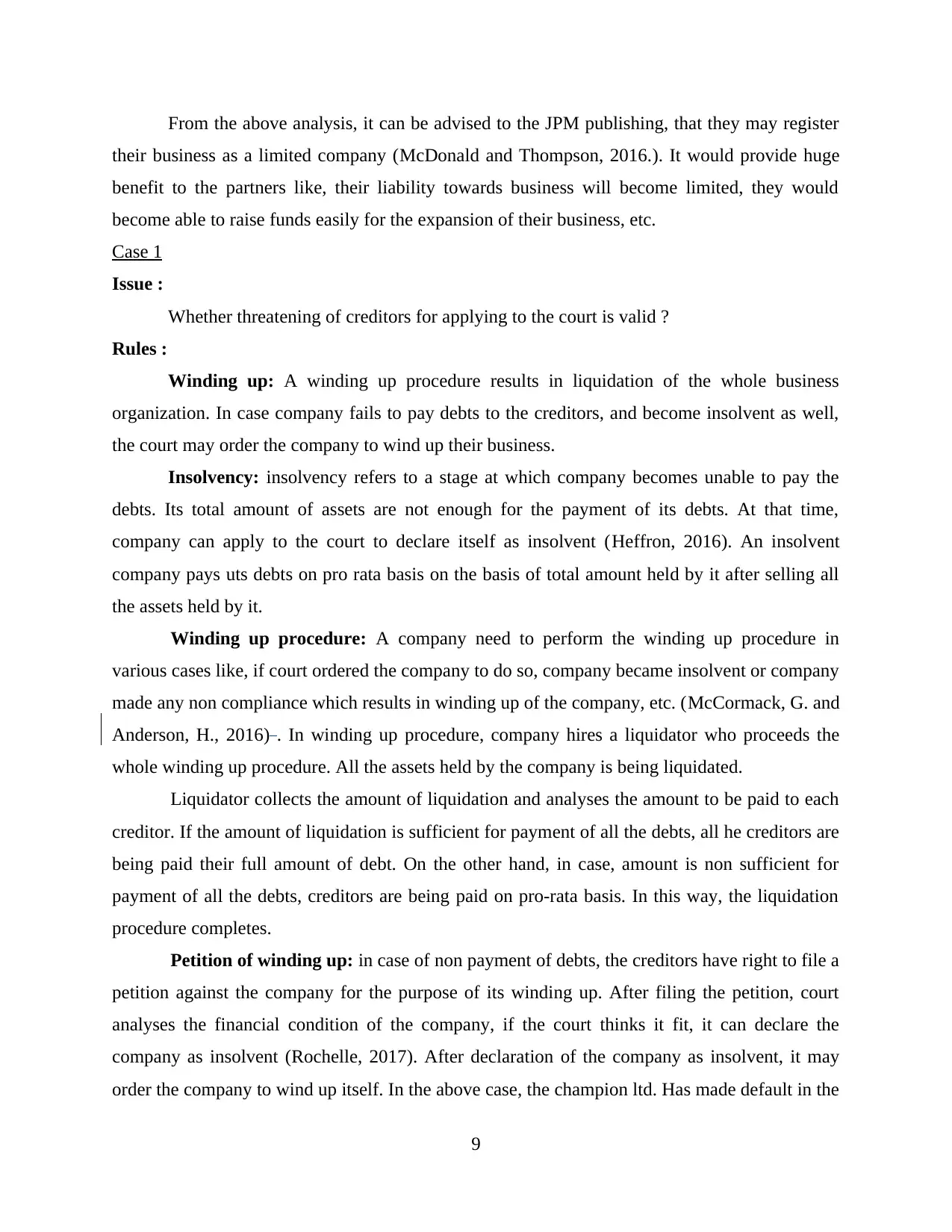
From the above analysis, it can be advised to the JPM publishing, that they may register
their business as a limited company (McDonald and Thompson, 2016.). It would provide huge
benefit to the partners like, their liability towards business will become limited, they would
become able to raise funds easily for the expansion of their business, etc.
Case 1
Issue :
Whether threatening of creditors for applying to the court is valid ?
Rules :
Winding up: A winding up procedure results in liquidation of the whole business
organization. In case company fails to pay debts to the creditors, and become insolvent as well,
the court may order the company to wind up their business.
Insolvency: insolvency refers to a stage at which company becomes unable to pay the
debts. Its total amount of assets are not enough for the payment of its debts. At that time,
company can apply to the court to declare itself as insolvent (Heffron, 2016). An insolvent
company pays uts debts on pro rata basis on the basis of total amount held by it after selling all
the assets held by it.
Winding up procedure: A company need to perform the winding up procedure in
various cases like, if court ordered the company to do so, company became insolvent or company
made any non compliance which results in winding up of the company, etc. (McCormack, G. and
Anderson, H., 2016) . In winding up procedure, company hires a liquidator who proceeds the
whole winding up procedure. All the assets held by the company is being liquidated.
Liquidator collects the amount of liquidation and analyses the amount to be paid to each
creditor. If the amount of liquidation is sufficient for payment of all the debts, all he creditors are
being paid their full amount of debt. On the other hand, in case, amount is non sufficient for
payment of all the debts, creditors are being paid on pro-rata basis. In this way, the liquidation
procedure completes.
Petition of winding up: in case of non payment of debts, the creditors have right to file a
petition against the company for the purpose of its winding up. After filing the petition, court
analyses the financial condition of the company, if the court thinks it fit, it can declare the
company as insolvent (Rochelle, 2017). After declaration of the company as insolvent, it may
order the company to wind up itself. In the above case, the champion ltd. Has made default in the
9
their business as a limited company (McDonald and Thompson, 2016.). It would provide huge
benefit to the partners like, their liability towards business will become limited, they would
become able to raise funds easily for the expansion of their business, etc.
Case 1
Issue :
Whether threatening of creditors for applying to the court is valid ?
Rules :
Winding up: A winding up procedure results in liquidation of the whole business
organization. In case company fails to pay debts to the creditors, and become insolvent as well,
the court may order the company to wind up their business.
Insolvency: insolvency refers to a stage at which company becomes unable to pay the
debts. Its total amount of assets are not enough for the payment of its debts. At that time,
company can apply to the court to declare itself as insolvent (Heffron, 2016). An insolvent
company pays uts debts on pro rata basis on the basis of total amount held by it after selling all
the assets held by it.
Winding up procedure: A company need to perform the winding up procedure in
various cases like, if court ordered the company to do so, company became insolvent or company
made any non compliance which results in winding up of the company, etc. (McCormack, G. and
Anderson, H., 2016) . In winding up procedure, company hires a liquidator who proceeds the
whole winding up procedure. All the assets held by the company is being liquidated.
Liquidator collects the amount of liquidation and analyses the amount to be paid to each
creditor. If the amount of liquidation is sufficient for payment of all the debts, all he creditors are
being paid their full amount of debt. On the other hand, in case, amount is non sufficient for
payment of all the debts, creditors are being paid on pro-rata basis. In this way, the liquidation
procedure completes.
Petition of winding up: in case of non payment of debts, the creditors have right to file a
petition against the company for the purpose of its winding up. After filing the petition, court
analyses the financial condition of the company, if the court thinks it fit, it can declare the
company as insolvent (Rochelle, 2017). After declaration of the company as insolvent, it may
order the company to wind up itself. In the above case, the champion ltd. Has made default in the
9
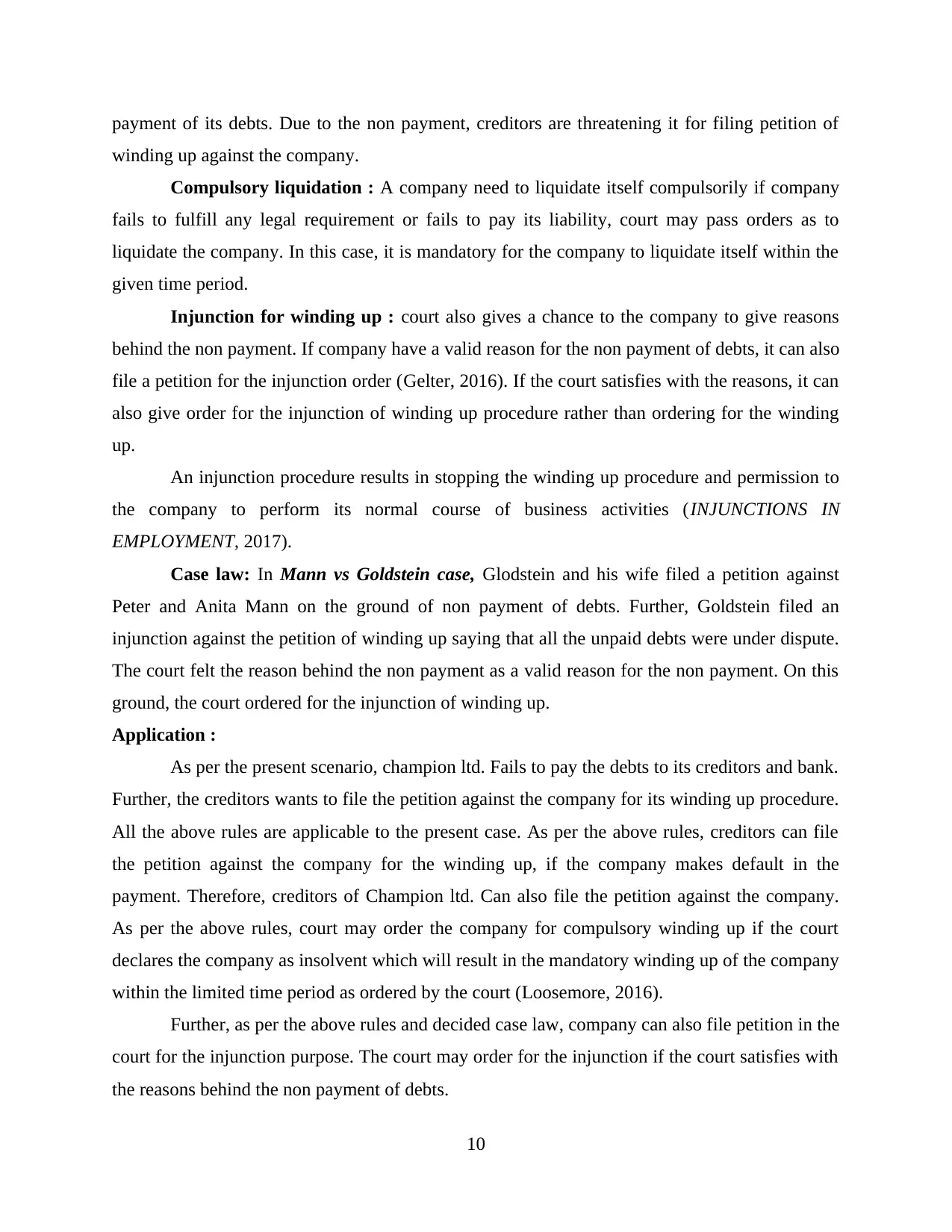
payment of its debts. Due to the non payment, creditors are threatening it for filing petition of
winding up against the company.
Compulsory liquidation : A company need to liquidate itself compulsorily if company
fails to fulfill any legal requirement or fails to pay its liability, court may pass orders as to
liquidate the company. In this case, it is mandatory for the company to liquidate itself within the
given time period.
Injunction for winding up : court also gives a chance to the company to give reasons
behind the non payment. If company have a valid reason for the non payment of debts, it can also
file a petition for the injunction order (Gelter, 2016). If the court satisfies with the reasons, it can
also give order for the injunction of winding up procedure rather than ordering for the winding
up.
An injunction procedure results in stopping the winding up procedure and permission to
the company to perform its normal course of business activities (INJUNCTIONS IN
EMPLOYMENT, 2017).
Case law: In Mann vs Goldstein case, Glodstein and his wife filed a petition against
Peter and Anita Mann on the ground of non payment of debts. Further, Goldstein filed an
injunction against the petition of winding up saying that all the unpaid debts were under dispute.
The court felt the reason behind the non payment as a valid reason for the non payment. On this
ground, the court ordered for the injunction of winding up.
Application :
As per the present scenario, champion ltd. Fails to pay the debts to its creditors and bank.
Further, the creditors wants to file the petition against the company for its winding up procedure.
All the above rules are applicable to the present case. As per the above rules, creditors can file
the petition against the company for the winding up, if the company makes default in the
payment. Therefore, creditors of Champion ltd. Can also file the petition against the company.
As per the above rules, court may order the company for compulsory winding up if the court
declares the company as insolvent which will result in the mandatory winding up of the company
within the limited time period as ordered by the court (Loosemore, 2016).
Further, as per the above rules and decided case law, company can also file petition in the
court for the injunction purpose. The court may order for the injunction if the court satisfies with
the reasons behind the non payment of debts.
10
winding up against the company.
Compulsory liquidation : A company need to liquidate itself compulsorily if company
fails to fulfill any legal requirement or fails to pay its liability, court may pass orders as to
liquidate the company. In this case, it is mandatory for the company to liquidate itself within the
given time period.
Injunction for winding up : court also gives a chance to the company to give reasons
behind the non payment. If company have a valid reason for the non payment of debts, it can also
file a petition for the injunction order (Gelter, 2016). If the court satisfies with the reasons, it can
also give order for the injunction of winding up procedure rather than ordering for the winding
up.
An injunction procedure results in stopping the winding up procedure and permission to
the company to perform its normal course of business activities (INJUNCTIONS IN
EMPLOYMENT, 2017).
Case law: In Mann vs Goldstein case, Glodstein and his wife filed a petition against
Peter and Anita Mann on the ground of non payment of debts. Further, Goldstein filed an
injunction against the petition of winding up saying that all the unpaid debts were under dispute.
The court felt the reason behind the non payment as a valid reason for the non payment. On this
ground, the court ordered for the injunction of winding up.
Application :
As per the present scenario, champion ltd. Fails to pay the debts to its creditors and bank.
Further, the creditors wants to file the petition against the company for its winding up procedure.
All the above rules are applicable to the present case. As per the above rules, creditors can file
the petition against the company for the winding up, if the company makes default in the
payment. Therefore, creditors of Champion ltd. Can also file the petition against the company.
As per the above rules, court may order the company for compulsory winding up if the court
declares the company as insolvent which will result in the mandatory winding up of the company
within the limited time period as ordered by the court (Loosemore, 2016).
Further, as per the above rules and decided case law, company can also file petition in the
court for the injunction purpose. The court may order for the injunction if the court satisfies with
the reasons behind the non payment of debts.
10
⊘ This is a preview!⊘
Do you want full access?
Subscribe today to unlock all pages.

Trusted by 1+ million students worldwide
1 out of 16
Related Documents
Your All-in-One AI-Powered Toolkit for Academic Success.
+13062052269
info@desklib.com
Available 24*7 on WhatsApp / Email
![[object Object]](/_next/static/media/star-bottom.7253800d.svg)
Unlock your academic potential
Copyright © 2020–2026 A2Z Services. All Rights Reserved. Developed and managed by ZUCOL.





